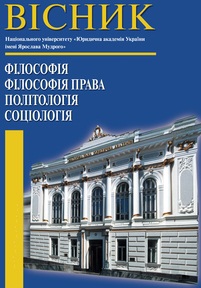ПОСТМОДЕРНІЗМ ЯК МЕТОДОЛОГІЯ СУЧАСНИХ СМИСЛОВИХ ВІЙН
POSTMODERNISM AS A METHODOLOGY OF MODERN SEMANTIC WARS
Author(s): Mikhail Petrovich Trebin, Oleksandr Yurievich PanfilovSubject(s): Media studies, Semiology, Political Philosophy, Structuralism and Post-Structuralism, Theory of Communication, Philosophy of Law
Published by: Національний юридичний університет імені Ярослава Мудрого
Keywords: semantic war; semantic weapons; postmodernism; postmodern discourse; simulacrum;
Summary/Abstract: Problem setting. The information war is not a united one, it includes three different aspects - the information and technical war (aimed at cyber resources), the information and psychological war (designing to make an opponent decide in the way necessary for an attacking side) and the semantic war. Researchers note that, in contrast to others, the semantic war has far goals that lie even beyond the limits of the life of a generation. Unlike facts that are constantly changing, meanings remain valid for a long time as they reflect the model of the world. The semantic war deals with interpretations based on the existing model of the world. Interpretation processes, being more complex, become more important than just informational ones.Thus, the problem of searching for the methodological foundations of conducting semantic confrontation, changing the value system, and the world picture of the general public of the society is becoming more and more topical.Recent research and publications analysis. The issues of certain aspects of semantic wars are in the centre of attention of such researchers as Yu. Gromyko, A. Dzholos, R. Marutyan, A. Pelin, G. Pocheptsov, Yu. Solomonov and others. However, the methodology of semantic warfare remains insufficiently studied although this can help freely “enter” the “territory of meanings” of the victim of aggression, change the value system, and the picture of the world.Paper objective. The goal of this paper is to clear up the methodological foundations of modern semantic wars.Paper main body. The article attempts to determine the methodology of modern semantic wars. It is justified that postmodernism is one of the methodologies that can be used to explain the phenomenon of semantic weapons. Postmodernist discourse greatly differs from other philosophical directions in terms of topics, conceptual apparatus, and ideological foundations, especially in the context of the formation of a modern information society.It is determined that several basic ideas can be distinguished within the postmodern discourse, these ideas being successfully used in the present semantic confrontations. First, this is the textualization of the world. The world should be understood as a text. Second, since everything is understood as a text, the subject exists within the text. Moreover, the subject is absorbed by the text. A person appears as a set of different identities that are tied to one or another local-cultural condition or socio-political context. Third, postmodernism is characterized by disillusionment with the ideals of the Enlightenment. In particular, the Reason is not believed in any more, causal relationships and absolute values are denied. Fourth, the postmodernist discourse is principally anti-fundamental, it is not interested in substantial unity and ultimate (metaphysical) causes but in decentralized, scattered sets - differences. Fifth, an important place in the modern postmodern discourse belongs to the theory of simulacrum.A simulacrum is a product of simulation, which replaces the real world with an imaginary one but which is more acceptable for a person as a real one. A simulacrum produces (simulates) a similarity but only as an external effect. Its internal principle is the difference, due to which it eludes of identity, similarity, likeness. It destroys the sample and multiplies the copies so that it is not possible any longer to tell where the copy is and where the original is. Simulacra give rise to the phenomenon of masses. Masses are defined as the silent majority, a black hole absorbing social aspects. The masses gravitate toward a physical and static form, which is simultaneously non-social and supra-social.Conclusions of the research. It is concluded that postmodernism brings about new ways of understanding social and political reality since it offers own type of rationality. Based on the postmodern discourse, a characteristic basic semantic toolkit arises as a feature of semantic wars: the simulation, that is the creation of simulacra – missing reality images that lack originality and that are superficial, hyper-realistic objects that do not have any reality behind them; reinterpretation of events and phenomena of reality; the coverage of not just one segment of the population but the general public; more interest that does not focus on a fact but on its rethinking, the creation of an apparatus for rejecting own “incorrect” interpretations.
Journal: Вісник НЮУ імені Ярослава Мудрого. Серія: Філософія, філософія права, політологія, соціологія
- Issue Year: 44/2020
- Issue No: 1
- Page Range: 53-65
- Page Count: 13
- Language: Ukrainian

